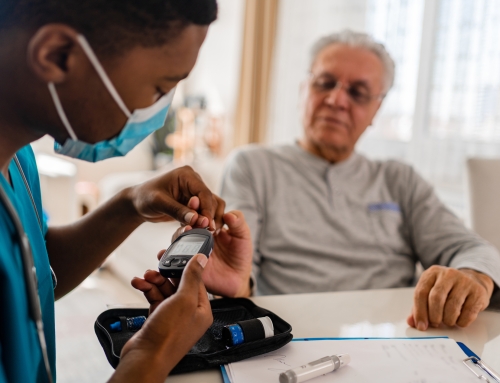By Collette Powers, MA, RDN, LDN, ACSM EP
The year 2020 has proven to be a challenging year. Not only have many had to fight COVID-19 head-on, but millions have experienced the repercussions of the pandemic such as job loss, increased anxiety and stress, food insecurity, and social isolation to name a few. As our nation continues to fight this fight, we now have to consider and prepare for other illnesses commonly seen around this time of year such as upper respiratory infections (also known as the common cold), influenza (flu) and pneumonia. With fall here and winter around the corner, there are things we can incorporate into our daily routines to help boost our immune system and lower our risk of getting sick.
So where do you start? Keep it simple with the “Three P” approach:
- PROMOTE optimal nutrition
- Include regular PHYSICAL activity
- Manage PRESSURE and stress
PROMOTE Optimal Nutrition
There are many nutrients that help to build and support a strong immune system. Let us first start with one of our key macronutrients: protein. Protein plays a vital role in the healing process and building strong muscles. Various factors impact how much protein one needs as well as the type of protein—such as your current stage of chronic kidney disease, if you are or are not on dialysis, also diagnosed with Diabetes, etc. Generally speaking, those on dialysis often need more “high quality” protein from animal sources—such as chicken, beef, eggs and turkey—where those with earlier stages of kidney disease may benefit from more “low quality” protein that is found in plant-based sources—such as nuts, beans and soy.1,2,3 Protein is best absorbed by the body when consumed in smaller increments and spread throughout the day. Speak with your health care provider or registered dietitian to assess your personal needs.
Now let us dig into our immune-boosting vitamins! Please note, the following recommendations are based on obtaining these vitamins from food sources. Taking additional supplementation, unless otherwise directed by your physician, can be extremely dangerous and increase one’s risk for vitamin toxicity. Always discuss with your doctor before taking any supplements to assess for appropriateness and safety.4,5
Let us first start with Zinc. Zinc is vital in helping the immune system function properly. It also aids with wound healing and appetite regulation. Zinc is most readily absorbed from animal protein sources—like poultry and seafood—and some plant-based proteins—like seeds, beans, and whole grain products. 4,6
Remember your ACE Vitamins:
Vitamin A: kidney-friendly food sources include broccoli, carrots, red bell peppers, and eggs.
Vitamin C: common food sources include bell peppers, citrus fruits, berries, and melons.
Vitamin E: found in fortified cereals, seeds, nuts, and peanut butter.
So how do you make sure you get enough of these vitamins through food? The Academy of Nutrition and Dietetics recommends striving to eat five to seven servings of vegetables and fruits daily, consume well-balanced meals and eating a variety of choices from the food groups.7 Ask for help from your health care provider or your registered dietitian in creating a meal plan if needed.
Include Regular PHYSICAL Activity
According to the American College of Sports Medicine, moderate-intensity physical activity is associated with better immune function and can also help manage stress.8 The Physical Activity Guidelines for Americans recommend 150 to 300 minutes of weekly exercise, including a variety of activities, and at least two sessions of strength/resistance training per week. For many this has been difficult because of the COVID-19 pandemic due to social isolation mandates, fitness center closings and loss of jobs to afford gym memberships to name a few. However, there are many ways you can still be active at home! Whether it is walking for 5 minutes, 10 minutes, or even taking a lap around your living room every 30 minutes, find an activity that will work best for you. Working towards 30 minutes a day most days of the week will get you into the goal range of 150 minutes per week. Remember to always consult your physician before starting a new exercise routine to assess for appropriateness and safety. To learn more about how to include exercise into your lifestyle, check out these other education offerings through the Dialysis Patient Citizens Education Center:
- Online Course: Exercise and the Benefits to You and Your Kidneys
https://www.dpcedcenter.org/resources/online-courses/exercise-and-the-benefits-to-you-and-your-kidneys/ - Article: Work Those Kidneys Out!
https://www.dpcedcenter.org/news-events/news/work-those-kidneys-out/ - Webinar: Get Your Sweat On! Exercising for Healthier Kidneys
https://www.dpcedcenter.org/education-webinar/get-your-sweat-on-exercising-for-healthier-kidneys/
Manage PRESSURE and Stress
According to the American Psychological Association, stress has a significant impact on your immune system.9 Studies have shown that the human body, when faced with higher stress levels, creates a physiological response where your natural killer cells that help fight infections significantly reduce. So, with every-day stressors, on top of the extra stressors brought on by the COVID-19 pandemic, how do you reduce stress? Every person is different in finding the approach that works best for them. For some, it may be regular exercise. For others, daily meditation, journaling or listening to calming music, talking to a friend, or simply focusing on getting more sleep may be the trick.6 It may only take one activity or it make take several to help you feel at ease. In the end, it is about finding what works for you and keeping with it to create a long-term change. For more ideas on how to help manage stress, check out the Centers for Disease Control and Prevention Coping Stress site at https://www.cdc.gov/coronavirus/2019-ncov/daily-life-coping/managing-stress-anxiety.html.
So now you have the “Three P” approach to help get you started. Whichever area you choose to focus on, remember to keep it simple. Pick one or two things you feel you can realistically do. Any change is better than no change and with time, these new changes will become a normal part of your lifestyle routine!
Still want to learn more? Check out these resources to help support you on your journey. Also tune in on February 25th, 2021 at 2:00 p.m. EST where I will talk more about nutrition and exercise to help build a healthy immune system.
- Academy of Nutrition and Dietetics: Support Your Health With Nutrition: https://www.eatright.org/health/wellness/preventing-illness/support-your-health-with-nutrition
- Academy of Nutrition and Dietetics: How to Keep Your Immune System Healthy: https://www.eatright.org/health/wellness/preventing-illness/how-to-keep-your-immune-system-healthy
- National Kidney Foundation: 7 Kidney-Friendly Superfoods:
https://www.kidney.org/content/7-kidney-friendly-superfoods
Collette Powers is a Licensed and Registered Dietitian through the Commission on Dietetic Registration and a Certified Exercise Physiologist through the American College of Sports Medicine with over eight years of experience in working with the renal population.







